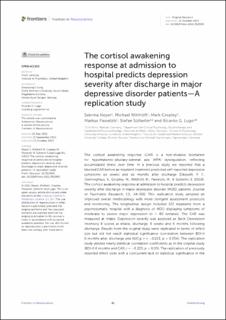The Cortisol Awakening Response at Admission to Hospital predicts Depression Severity After Discharge in MDD patients -A Replication Study
Neyer, Sabrina E.; Witthöft, Michael; Cropley, Mark; Pawelzik, Markus; Sütterlin, Stefan; Lugo, Ricardo Gregorio
Peer reviewed, Journal article
Published version

View/
Date
2022Metadata
Show full item recordCollections
Abstract
The cortisol awakening response is a non-invasive biomarker for hypothalamic-pituitary-adrenal axis (HPA) dysregulation, reflecting accumulated stress over time. In a previous study we reported that a blunted CAR before an inpatient treatment predicted self-reported depressive symptoms six weeks and six months after discharge (XXXXXXXXX et al., 2019). This replication study adopted an improved overall methodology with more stringent assessment protocols and monitoring. The longitudinal design included 122 inpatients from a psychosomatic hospital with a diagnosis of Major Depression Disorder displaying symptoms of moderate to severe major depression (n=80 females). The Cortisol awakening response (CAR) was measured at intake. Depression severity was assessed as Beck Depression Inventory II scores at intake, discharge, six weeks and six months following discharge. Results from the original study were replicated in terms of effect size but did not reach statistical significance (correlation between BDI-II 6 months after discharge and AUCg: r=-.213; p=.054). The replication study yielded nearly identical correlation coefficients as in the original study (BDI-II 6 months and CAR, r=-.223, p<.05). The replication of previously reported effect sizes with a concurrent lack of statistical significance in the more restrictive, larger and better controlled replication study may well inform research on psycho-endocrinological predictors for treatment success, but suggests a rather limited practical relevance for cortisol awakening response measures in this clinical context. The Cortisol Awakening Response at Admission to Hospital predicts Depression Severity After Discharge in MDD patients -A Replication Study
